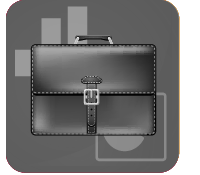Talking about ourselves
Today we are learning how to introduce ourselves in French. This key-topic is suitable to any situation: at work, for a social event, when making new friends, and is essential when travelling.
Talking about yourself in French
Where audio files are available, we advise you to practice the pronunciation by repeating a minimum of 3 times, for your brain to assimilate the structure.
We will focus on:
- your name
- your nationality
- your age
- what you do
- where you live
- your family/marital status
1. Your name.

Although the literal translation for "My name is - " is now accepted in French, it is not idiomatic. People rather use the "I am called -" form.
|
Mon nom est Laura. |
My name is Laura. |
|
Je m'appelle Laura. |
I am called Laura. |
The sentences in blue are more idiomatic.
2. Your nationality

To say where you are from, you have got two options.
|
Je suis anglais(e). |
I am English. |
|
Je viens d'Angleterre. |
I come from England. |
In the first structure, i.e. when using the adjective for the nationality, you will have to use the correct genre: masculine or feminine:
|
Paul |
Laura |
Translation |
|
anglais |
anglaise |
English |
|
irlandais |
irlandaise |
Irish |
|
écossais |
écossaise |
Scottish |
|
gallois |
galloise |
Welsh |
|
britannique |
britannique |
British |
|
australien |
australienne |
Australian |
|
indien |
indienne |
Indian |
|
américain |
américaine |
American |
The second structure only uses the name of your country with the preposition "de".
- Je viens d'Angleterre.
- Je viens d'Irlande (du Nord).
- Je viens d'Écosse.
- Je viens du Pays de Galles.
- Je viens de Grande Bretagne. (GB) Je viens du Royaume Uni, (UK)
- Je viens d'Australie.
- Je viens d'Amérique (du Nord). Je viens des Etats-Unis. (US)
- Je viens d'Inde.
3. Your age.
Though it is not always recommended to ask someone's age in France either, you may do so in a more relaxed context. Be careful: French people use the verb TO HAVE, not to be!
- J'ai 30 ans.
NOT: Je suis 30 ans.
Be careful with the pronunciation!
The pronunciation of "ans" can be tricky and, unfortunately, you cannot omit it in French, as you do in English. Try pinching your nose to get the nasal sound right the first few times. It helps!
4. What you do.

You can either use the title of your position, without the article "a":
|
Je suis professeur. |
I am a teacher. |
|
Je suis technicien. |
I am a technician. |
|
Je suis docteur. |
I am a doctor. |
|
Je suis assistant. |
I am an assistant |
|
Je suis directeur/manager. |
I am a director/a manager. |
|
Je suis employé de bureau. |
I am an employee. |
|
Je suis ouvrier. |
I am a worker. (factory) |
|
Je suis autoentrepreneur. |
I am self-employed. |
|
Je suis retraité. |
I am retired. |
|
Je suis chômeur. |
I am on the dole. |
or more broadly introduce the place you work at.
|
Je travaille dans une école. |
I work in a school. |
|
Je travaille dans un hôpital. |
I work in a hospital. |
|
Je travaille dans un bureau. |
I work in an office. |
|
Je travaille dans une banque. |
I work in a bank. |
|
Je travaille dans une usine. |
I work in a factory. |
|
Je travaille de la maison. |
I work from home. |
5. Where you live.
The French structure is the same as the English one.
J'habite à Londres. I live in London.
J'habite à Camden. I live in Camden.
Note the preposition "à" for cities and districts. Look up the French translation of your city.
J'habite dans une maison. I live in a house.
J'habite dans un appartement. I live in a flat.
6. Family - marital status.

Without going into details, here are a few examples of how to give people some background about yourself.
|
Je suis célibataire. |
I am single. |
|
Je suis en couple. |
I am in a relationship. |
|
Je suis marrié(e). |
I am married. |
|
Je suis divorcé(e). |
I am divorced. |
|
Je suis veuf/veuve. |
I am a widower/a widow. |
|
J'ai un enfant. |
I've got one child. |
|
J'ai deux enfants. |
I've got two children. |
The same goes for pets!
J'ai un chat, un chien, un oiseau, des poissons.
I've got a cat, a dog, a bird, fish.
Put it into practice!
Now you can easily write a short text about yourself, using "J'ai" or "Je suis". Remember to practice the pronunciation!
Example:
Je m'appelle Laura. J'ai 30 ans. Je suis anglaise. J'habite à Londres, à Camden. Je travaille dans un bureau, je suis manager. Je suis célibataire et j'ai un chien, Rex. Et toi ?
Thanks for visiting!
Some other stuff here
This Course
Basic French

Just getting started? Here are all the basics, from introducing yourself, to numbers, the alphabet and loads more crazy Gallic stuff.
Other sections in this course
Real French I

Forget the textbooks. Here's the sort of informal French you'll hear amongst friends.
It's the type of really practical language that you'll use all the time in casual conversations, but nobody's actually ever bothered to teach you. Until now.
1.2: Show me more!

You've learnt the basics (Tell me you've learnt the basics!) and want to move on? Let's look at likes and loves and a whole load of other stuff.
Basic French Grammar

Your starter's guide to French grammar rules.
1.1 Know nothing? Start here!

Bienvenue to our series of classes for anyone starting to learn French, or those of you who were smoking behind the bike sheds when they should have been in French class.
Our focus in these classes is on real, practical examples which you can start to use straight away. We'll keep grammar to a minimum, promise!
1.1 Know nothing? Start here!
Other classes in this section:
My First 20 French Phrases

Who says you have to start with boring grammar? Here are the first 20 French phrases you'll want to know if you are just starting to learn French.
My first 30 Questions in French

A great introduction to forming questions in French. From asking for directions, ordering in a restaurant, to finding out if that cute guy/girl is married or not. Here's out guide to the top 30 French questions for beginners.
The ten most common French verbs

Let's get started on French verbs with 5 of the most common. We've also included loads of examples phrases and questions.
Numbers in French

The French numbers up to 100, including all those crazy numbers from 70 to 99. Audio provided.
5 Things you really need to know about French

Talking about ourselves

nothing
